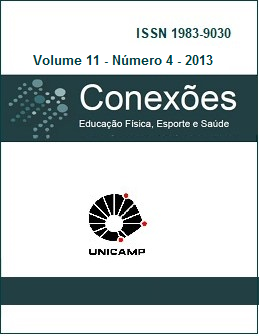Abstract
The opinion of the family can also portray expectations regarding the participation of their
children in physical education classes or even in school routine, which are the objectives of
this study. Participants 130 families of students with special needs, which were assessed by
questionnaire. The results showed that the vast majority of these families are women,
where the mother is the most caring. The exemption from physical education classes
occurs by different factors, including medical advice. The vast majority of families
(90.9%) are in favor of participation of students with special needs in physical education
classes, even agree that such participation promotes inclusive education, although 40% of families are unaware of the activities. The opinion of the family, the school's participation
in the process of inclusion of students with special needs in physical education classes and
seen as absent for 76.5% of families and 94.1% indicate the need for improvement to
appropriate care. The family pointed to the benefits of inclusion in physical education
classes physical, psychological and social negative aspects included the inadequacy and
difficulty of participation in the activities proposed by the teacher, and the teacher's
unpreparedness, beyond prejudice.
References
ROCHA, L.; CARREIRO da COSTA, F. O que pensam os pais sobre o processo formativo em Educação Física na escola do 1° ceb. Disponível em: http://www.motricidade.com/index.php?option=com_content&view=article&id=102:o-que-pensam-os-pais-sobre-o-processo-formativo-em-educacao-fisica-na-escola-do-1o-ceb&catid=48:docencia&Itemid=31 Acesso em: maio 2010. Motricidade, Santa Maria da Feira, 2010.
SOLER, R. Educação inclusiva: em busca de uma escola plural. Rio de Janeiro: Sprint, 2005.
RAPOSO de MELO; MITJÁNS M. Realidade da participação de alunos com necessidades especiais nas aulas de educação física: visão do aluno e do professor, 2012. (in press).
SERRA, D. A educação de alunos autistas: entre os discursos e as práticas inclusivas das escolas regulares. Polemica, Rio de Janeiro, 2012.
SOUZA, M. S. Didática da educação física escolar e o processo lógico de apreensão do saber. Movimento, Porto Alegre, v. 13, n. 3, p. 181-199, 2007.
LAMASTER, K. et al. Inclusion practices of effective elementary specialists. Adapted Physical Activity Quarterly, Champaing, v. 15, p. 64-81, 1998.
BARDIN, L. Análise de conteúdo. Lisboa: Edições 70, 1977.
VERNIER-NEVES, E. T. O empoderamento de cuidadoras de crianças com necessidades especiais de saúde: interfaces com o cuidado de enfermagem. 2007. Tese (Doutorado em Enfermagem) – Faculdade de Enfermagem, Universidade Federal do Rio de Janeiro, Rio de Janeiro, 2007.
CURRIE, J.; MORETTI, E. Mother's education and the inter-generational transmission of human capital: evidence from college openings. Quarterly Journal of Economics, Cambridge, v.118, n. 4, p. 1495–1532, 2003.
GONZAGA, G.; CARUSI, D. O impacto dos fatores familiares sobre a defasagem idade-série de crianças no Brasil. Disponível em: http://www.econ.puc-rio/pdf/td546.pdf.
VIÑAO-FRAGO, A. Tiempos escolares, tiempos sociales: la distribuicíon del tiempo y del trabajo en la enseñanza primaria en españa (1838-1936). Barcelona, 1998.
DARIDO, S. C.; et al. Educação física no ensino médio: reflexões e ações. Motriz, Rio Claro, v. 5, n. 2, p. 138-145, 1999.
SANTIN, S. Educação física e esportes no ensino de 3º grau: perspectiva filosóficas e antropológicas. In: PASSOS, S. (Org.). Educação Física e esportes na universidade. Brasília: SEED/MEC, 1998.
COOPER, R. A. et al. Research on physical activity and health among people with disabilities: a consensus statement. Journal of Rehabilitation Research & Development, Baltimore, v. 36, n. 2, p. 142-154, 1999.
KODISH, S. et al. Determinants of physical activity in an inclusive setting. Adapted Physical Activity Quarterly, Champaing, v. 23, p. 390-409, 2006.
SEABRA JÚNIOR, L.; CARVALHO, B. P. O jogo e as interações sociais: reflexões acerca da intervenção profissional na educação formal e não formal. Movimento & Percepção, Espirito Santo do Pinhal, v. 6, n. 8, 2004.
RODRIGUES, D. A educação física perante a educação inclusiva: reflexões Conceptuais e metodológicas. Revista da Educação Física da UEM, Maringá, v.14, n. 1, p. 67-73, 2003.
CRUZ, G. C.; FERREIRA, J. R. Processo de formação continuada de professores de educação física em contexto educacional inclusivo. Revista Brasileira de Educação Física e Esporte, São Paulo, v.19, n. 2, p. 163-180, 2005.
CIDADE, R. E.; FREITAS, O. S. Educação física e inclusão: considerações para a prática pedagógica na escola. Integração, Brasilia, 1997.
MARTINELLI, C. R. et al. Educação física no ensino médio: motivos que levam as alunas a não gostarem de participar das aulas. Revista Mackenzie de Educação Física e Esporte, São Paulo, v. 5, n. 2, p. 13-19, 2006.
VANREUSEL, B. et al. A longitudinal study of youth sport participation and adherence to sport in adulthood. International Review for the Sociology of Sport, London, v. 32, n. 4, p. 373-87, 1997.
GAMBINI, W. J. Motivos da desistência em aulas de educação física no segundo grau. 1995. Monografia (Graduação em Educação Física) – Faculdade de Educação Física, Universidade Estadual Paulista, Rio Claro, 1995.
VERDERI, E. B. L. P. Dança na escola. Rio de Janeiro: Sprint, 1998.
SHERRILL, C. Adapted physical activity, recreation, and sport: cross disciplinary and lifespan. Dubuque, 1998.
SASSAKI, R. K. Inclusão: construindo uma sociedade para todos. Rio de Janeiro: WVA, 1997.
COSTA, A. M.; RODRIGUES, D. Special education in Portugal. European Journal of Special Needs Education, London, v. 14, n. 1, p. 70-89, 1999.
BLOCK, M. Development and validation of the children's attitudes toward integrated physical education- revised (caipe-r) inventory. Adapted Physical Activity Quarterly, Champaign, v. 12, p. 60-77, 1995.
KASSER, S.; LIBERMAN, L. Maximizing learning opportunities through Activity modification. Teaching Elementary Physical Education, Champaing, v. 14, n. 3, p. 19-22, 2003.
BRASIL. Ministério da Educação e Cultura. Parâmetros Curriculares Nacionais. Brasília, 1997.
The Conexões: Educação Física, Esporte e Saúde Journal uses the license of Creative Commons (CC), thus preserving the integrity of articles in an open access environment.


